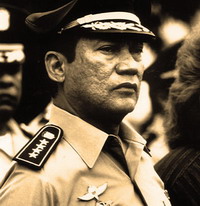Former Panamanian dictator Manuel Noriega to undego new hearing on hs extradiction
Court has set a new hearing for former Panamanian dictator Manuel Noriega on France's request to extradite him on money-laundering charges.

But U.S. District Judge Paul Huck said he would limit the hearing to the question of whether the French government has provided sufficient guarantees that Noriega will continue to be treated as a prisoner of war protected by the Geneva Conventions.
Huck did not immediately set a date but indicated the hearing would occur later this month.
"I think it makes sense to get this done as promptly as possible," Huck said.
Senior U.S. District Judge William Hoeveler has twice rejected Noriega's attempts to block his extradition to France. Noriega, 73, completed a U.S. drug racketeering sentence in September but remains in federal custody pending the French request's outcome.
Hoeveler presided over Noriega's criminal trial and declared him a POW because he was captured by U.S. forces in a 1989 invasion of Panama aimed at ousting him from power. Noriega is permitted to wear his military uniform and insignia in prison and gets certain benefits, such as access to a television and private living quarters.
U.S. prosecutors say France has provided diplomatic assurances that Noriega's POW status will continue. Noriega's lawyers say the Bush administration has refused to disclose those assurances and cited media accounts quoting French government officials as saying Noriega would be treated as a common criminal.
"It seems to me that could be resolved pretty easily," Huck said. "Either the French government provides protections or it doesn't."
France wants to put Noriega on trial for allegedly laundering more than $3 million (2.04 million EUR) in drug proceeds through French banks, using some of the money to buy luxury apartments in Paris. He faces 10 years in prison if convicted.
Huck said he would not revisit Hoeveler's earlier decisions on whether the Geneva Conventions prohibit Noriega from being extradited to a third country at all. Noriega's lawyers have unsuccessfully used that argument in an effort to get Noriega returned home to Panama, where he also faces legal troubles.
If Huck also rejects Noriega's arguments, the former general's attorneys have said they are ready to take the case to the 11th U.S. Circuit Court of Appeals - meaning a resolution of Noriega's status could take months or even years.
The final decision on Noriega's extradition to France would be made by the U.S. State Department.
Subscribe to Pravda.Ru Telegram channel, Facebook, RSS!





